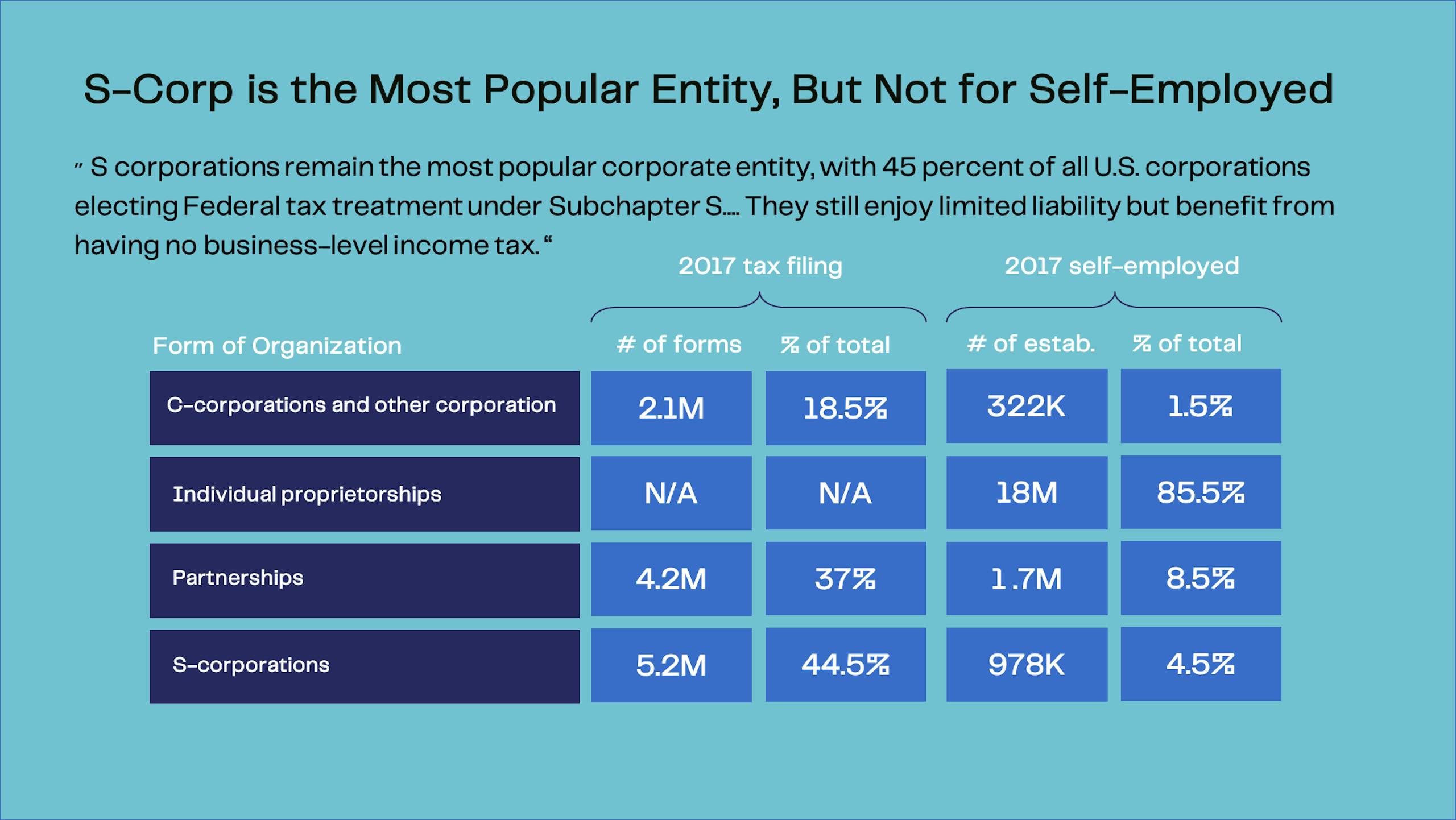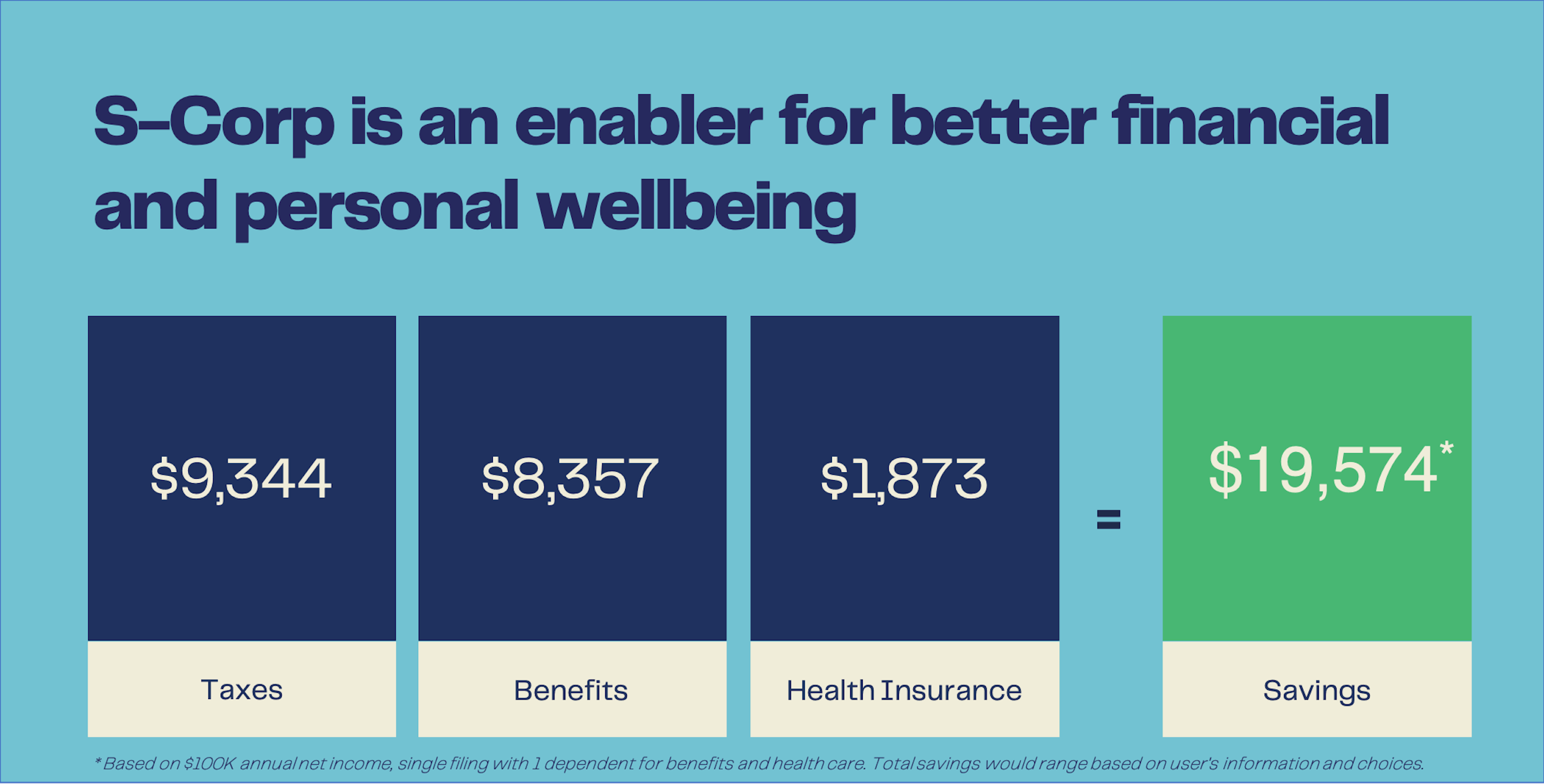
Helping Business Owners Unlock Their Financial Potential
We’ve been hard at work for the last several months getting ready for this moment when we can announce the launch of Formations. Formations is a new type of financial solution for self-employed. We automate the creation and ongoing management of S-Corp, the most tax-efficient structure for self-employed, and by doing so we enable self-employed professionals to save thousands of dollars each year on their taxes, get access to corporate-level benefits like health insurance and a 401(k), and start enjoying the benefits of a steady paycheck.
If you find yourself asking, “What is an S-Corp,” don’t feel bad; most people don’t know about it, which is one of the issues we’re trying to address because S-Corps are the key to unlocking some unbelievable financial opportunities for the self-employed. But before we explain what an S-Corp is, let’s talk about the self-employed and what’s broken with the accounting market today. (If you already know what S-Corp is, feel free to contact us to learn how we automate it and make it accessible and affordable for self-employed.)
Accounting for Self-Employed is Broken
As someone who’s been in the tax and accounting industry for 15 years, you can call me an insider. I’ve built a pretty successful business (over 3,500 customers, four offices, and 45 employees) taking care of people’s taxes (both personal and business). I’ve seen the industry from the inside, and I can tell you that it’s broken. Here’s why.
First, it’s outdated. The average age of a CPA in the US is 44.1, and over 38% of CPAs are over 50 (source), so it’s no surprise that the industry is old fashion. With an average age of 29 for new CPAs, most of the CPAs have been part of the industry for at least a decade. This means that for the most part, they are utilizing old, outdated techniques and practices. The CPA journal, one of the leading publications in the industry has stated that the aging of the profession continues to be an issue. Additionally, in the 2017 Rosenberg survey report, they mentioned the upcoming technology change but stated that “The results to date do not support the proposition that this sea change is already underway. In New York, firm work hours, charge hours and fees continue to increase. Audit and review services continue to increase, as does consulting services (11%).“
Second, it’s compliance-driven, not client-driven. The accounting practice, especially when dealing with individuals and self-employed, has evolved over the years to be compliance-driven and not client-driven. The role it serves is to make sure the client adheres to the rules and laws governing the accounting and tax practices, and help the client avoid an audit. It has become a field driven by FUD (fear, uncertainty, and doubt) instead of great service and peace of mind. Can you pick up the phone and talk to your accountant right away? Will you be able to talk to them today? How long will you have to wait? In a world where superb customer service, speed, and immediacy are becoming standard practices in almost any services business, the accounting field is not even trying to catch up.
Third, it’s manual and therefore slow and expensive. Accountants still ask for paper receipts, utilize old software, and run your books off excel spreadsheets with complicated formulas they wrote years ago or copied from their previous practice. They still ask you to come into the office and do the work for them, instead of working for you. This manual labor is being billed by the hour, and you are paying the price.
Lastly, accountants don’t care about you. Most revenue for accountants and CPAs comes from serving businesses and offering professional services that extend beyond the tax filing or the regular ongoing management of a small business. So, accountants and CPA firms chase the large deals that would give them a six-figure annual retainer, while they enjoy a large margin. Self-employed are left behind or are reduced to annual tax filing or billable consulting calls.
Self-Employed Continue to Bleed
In such a world where self-employed can’t get the attention they need from the practices that can help them optimize their business, they are left to continue to bleed their hard-earned money on taxes, bad financial decisions, and overpriced services.
Self-employed currently overpay taxes, have no access to affordable health insurance, and don’t utilize any retirement or savings vehicles. Additionally, they need to face key challenges in their business such as no guaranteed income, high upfront costs, multi-disciplinary duties without the proper knowledge or training, and limited time and resources. And without a W2 to build their credit score, apply for a loan, or use for tax withholding, it’s a wonder how they even get to keep their business afloat. In fact, according to the Bureau of Labor Statistics, 20% of small businesses don’t make it past their first year and 50% don’t survive the first 5 years. Additionally, according to CBInsights analysis, 29% of startups fail because they run out of cash. But despite all these challenges, full-time self-employment has held steady even in light of a strong employment market.
Self-Employment is on the Rise, But Could Use Some Help
According to research by MBO Partners on the 2019 self-employment segment, “41 million adult Americans are Independents of all ages, skills, and income levels—consultants, freelancers, contractors, solopreneurs, temporary, or on-call workers—who work independently to build businesses, develop their careers, pursue passions, and/or supplement their incomes. Together, they combine to make a powerful economic force. Over the past year, independent workers generated roughly $1.28 trillion of revenue for the U.S. economy—equal to about 6.2 percent of U.S. GDP (2018), or the entire economic output of Spain.”
While this workforce is growing, it’s also being overlooked and ignored. Today, the majority of the full-time self-employed do most of their daily business operations – think scheduling, payroll, customer support, invoicing, accounting, paying bills, etc. – with either pen and paper or generic tools which they have to augment with other systems in order to work for their needs. This isn’t because they are unsophisticated; just the opposite: running your own business is a lot harder than showing up to a cushy tech job with free food. It’s mostly because to date, business software development efforts — including products, marketing, and customer support — have mainly targeted big enterprises. (source: Forbes)
Additionally, almost half of small businesses (45%) employ neither an accountant nor a bookkeeper, meaning they have the burden of keeping their books themselves. While Quickbooks has been dominant for some time, many businesses would like to completely outsource bookkeeping so they can focus on their core work. In addition, 25 percent of small businesses still record their finances on paper, instead of on a computer.
The core issues of full-time self-employed are not getting the attention and focus that enterprises and even SMBs get from technology and software solutions. They also lack the resources to buy holistic or even point solutions, that can help them take care of non-core or peripheral tasks in their business.
Formations and S-Corp as an Enabler for Better Financial Future

This is why we started Formations, to give self-employed the support they need to thrive in today’s economy. We are building the world’s first S-Corp automation software that will sit in the heart of our financial solution. S-Corp is the most popular tax structure for SMBs in America, yet it’s completely underutilized by the self-employed. As of 2017, there were 5.1 million S-Corps in America, more than partnerships, C-Corps, or other corporate entities. Yet, out of over 22 million non-employer establishments (self-employed), less than 5% were S-Corps.
By moving to an S-Corp, self-employed individuals can save thousands of dollars on taxes every year, utilize W2 to pay their taxes liabilities, enroll in a Solo 401(k) program, and get access to affordable health insurance. With Formations, bookkeeping, accounting, payroll, and taxes are handled automatically and proactively so self-employed can focus on growing their business not maintaining their books.

We’re excited about the future of self-employment and our role in unlocking its financial potential. If you are interested in learning more, we would love to talk to you.


